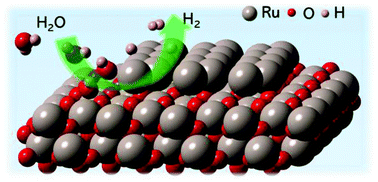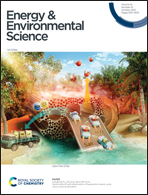Partially reduced Ru/RuO2 composites as efficient and pH-universal electrocatalysts for hydrogen evolution†
Abstract
Efficient and long-term stable electrocatalysts for the hydrogen evolution reaction (HER) via water splitting are urgently desired to ease the energy crisis and develop the sustainability of human society. However, the HER performance of state-of-the-art Pt in non-acidic solutions is unsatisfactory due to the severely sluggish kinetics. Here, DFT theoretical calculations reveal that the Ru/RuO2 composites enable high HER activity to be pursued under non-acidic conditions because of the distinctive Ru and RuO2 interface, which possess not only a strong capability to adsorb and dissociate water but also appropriate binding energies of H and OH. Therefore, we employ a simple strategy, including heating under an oxygen-poor environment and/or in situ electrochemical reduction, to partially reduce RuO2. The formed Ru/RuO2 interfaces demonstrate superior HER activities (e.g. η10 = 17 mV, 35 mV dec−1 in 1 M KOH) than Pt/C (e.g. η10 = 27 mV, 58 mV dec−1 in 1 M KOH) at both small (10–100 mA cm−2) and large (1 A cm−2) current densities in alkaline solution and even real seawater. Comprehensive experiments were conducted to investigate the structure-HER performance relationships. Moreover, benefiting from the bifunctional character of RuO2, a two-electrode system based on Ru/RuO2 composites and RuO2 exhibits the lowest cell voltage for water splitting in both 1 M KOH and 0.5 M H2SO4, respectively. A 300 h-stability test at 10 mA cm−2 without an obvious decay demonstrates the industrial prospects of the Ru/RuO2 composites to generate green energy.



 Please wait while we load your content...
Please wait while we load your content...